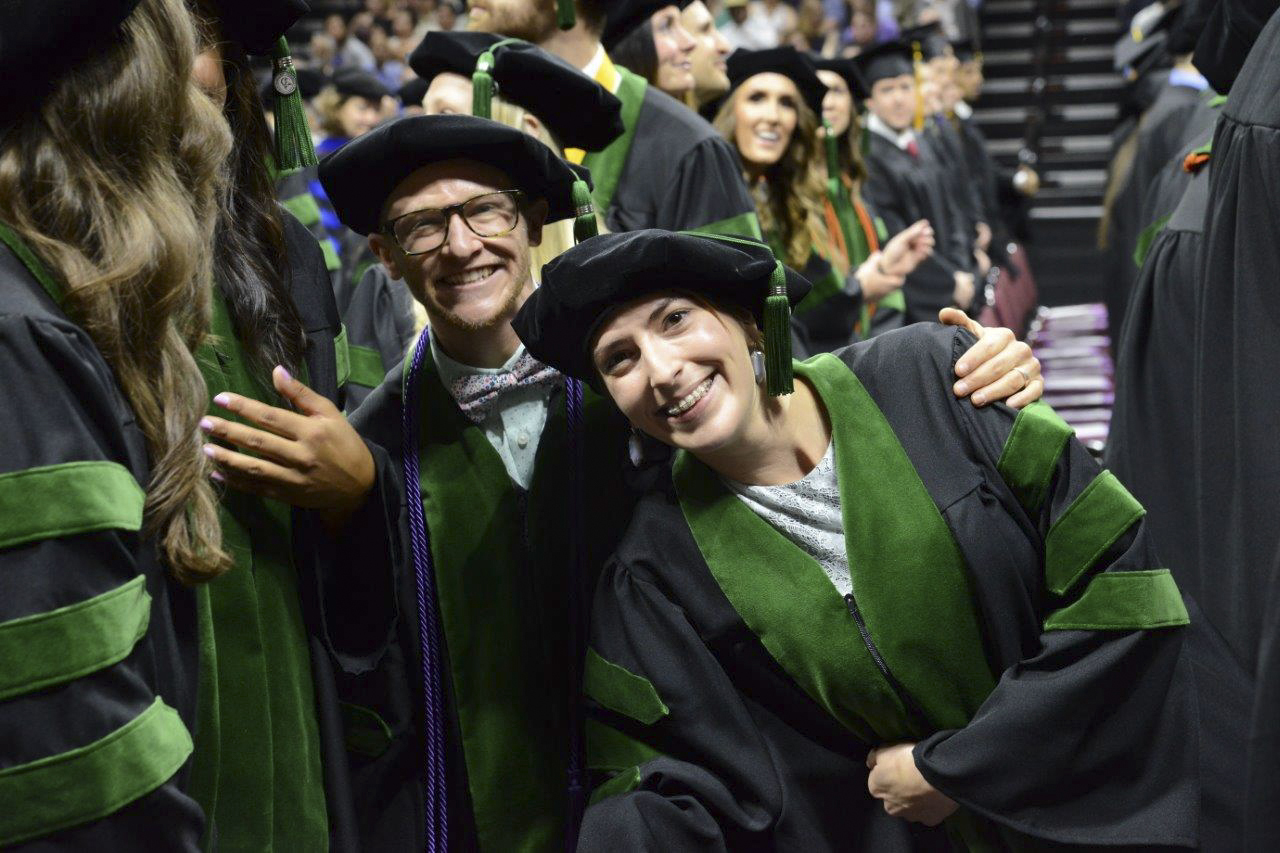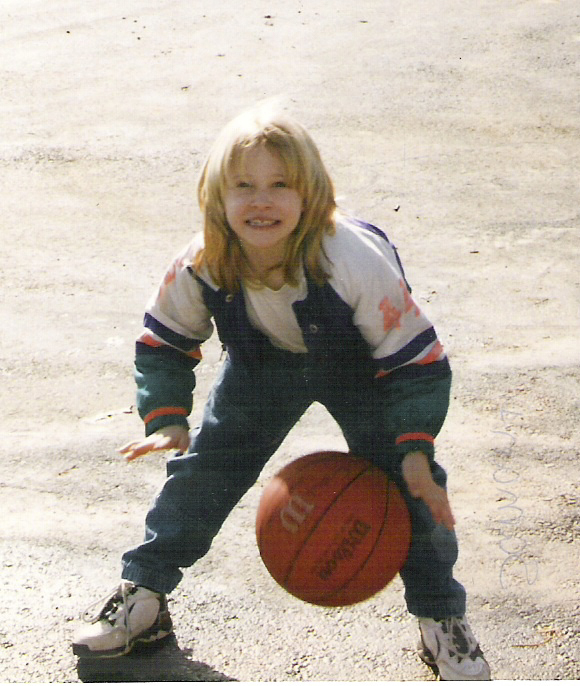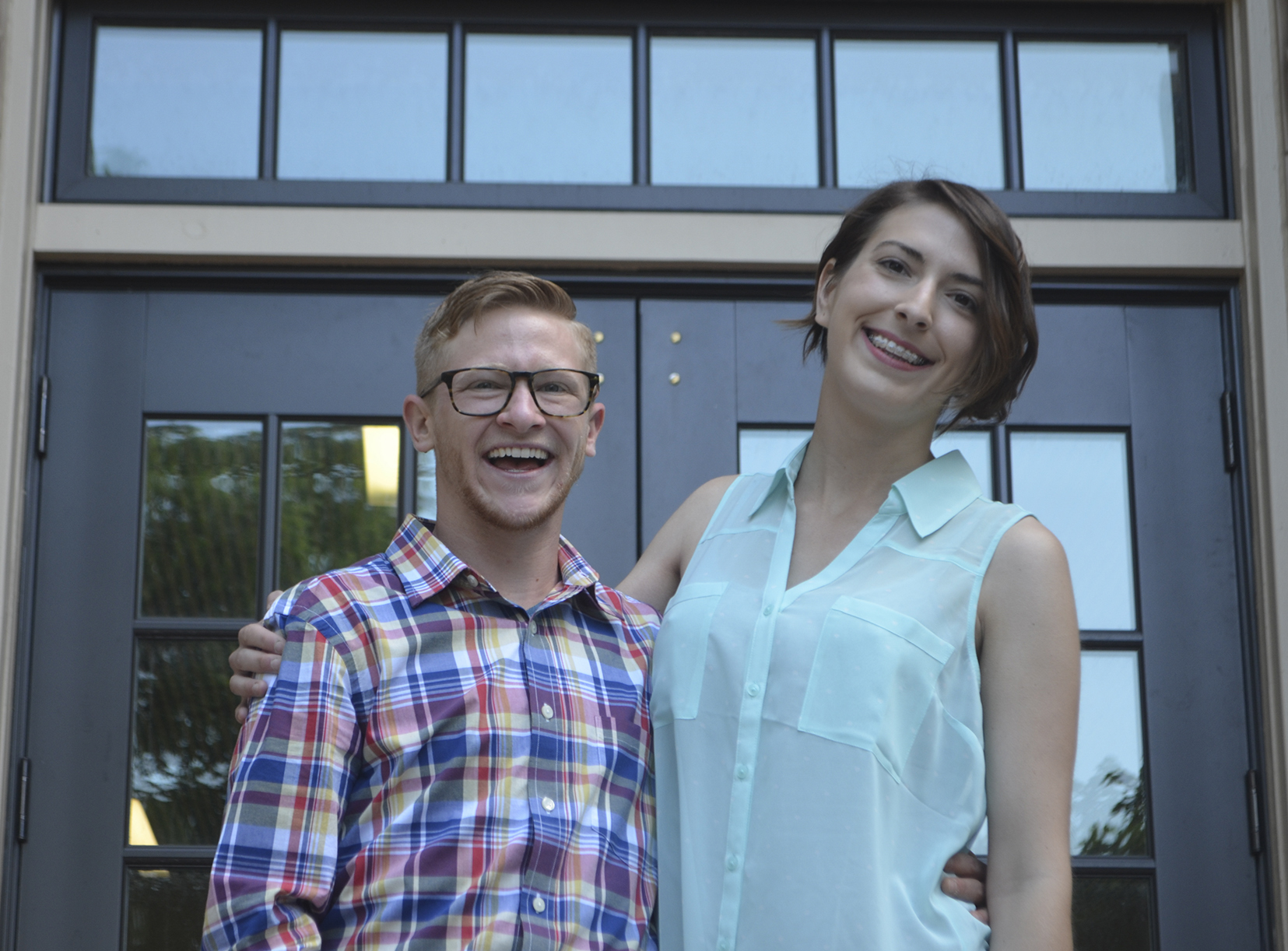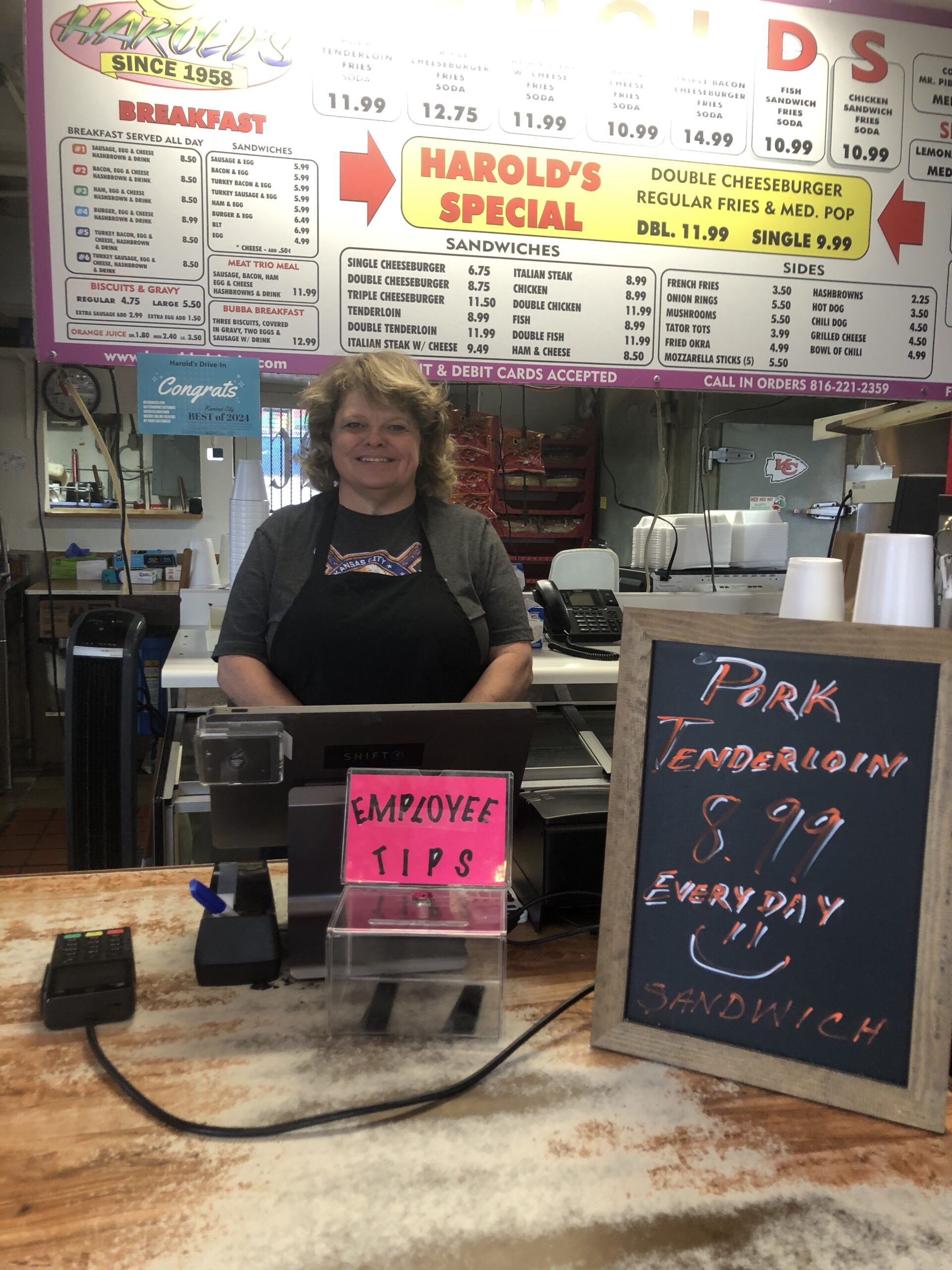
By Paul Thompson
Northeast News
May 31, 2017
KANSAS CITY, Missouri – Oliver Garbo and Brittney Diebold almost definitely met for the first time on the bus, early on in their first year of medical school at Kansas City University of Medicine and Biosciences (KCUMB). What’s uncertain, though, is exactly who initiated that first, fateful meeting. Brittney believes Oliver sat next to her; Oliver contests that he was seated first. At any rate, Oliver remembers sparks flying on his side of the coin.
“I was pretty disappointed, because she was with somebody else at the time,” Oliver recalled.
Still, the two became close friends and study partners. The pair became so ubiquitous in each other’s company that those around them started to question whether a romance was developing.
“Everyone thought we were together besides us,” said Oliver. “We were the last two to figure it out.”
Even Brittney’s parents took the hint before the couple, who eventually married in October of 2015.
“My mom gave us both a Christmas present, and it’s like tea to drink by the fire or something like that,” remembers Brittney. “I’m kind of like, ‘Oh my gosh, even my parents think we’re together.’”
For Oliver and Brittney, however, the evolution from friendship to courtship felt organic. The pair were still just friends when, during their second year of medical school, Oliver broached the subject of transitioning from female to male. No one was more encouraging than Brittney, who served as Oliver’s support system during the transition.
“I don’t think I would have maybe came out and started transitioning quite as quickly if it wasn’t for her, honestly,” Oliver said. “As far as my friends and my classmates go, she was definitely my go-to person, absolutely.”
Brittney’s acceptance and encouragement of Oliver’s decision to transition was only natural: she had viewed him as male even before their first conversation on that aforementioned bus ride. During first-year introductions, when each incoming student had merely a few moments to introduce themselves to the entire class, Brittney saw Oliver stand in front of a large room and say a few words.
“He introduced himself, and I was like, ‘Wow, that’s the youngest guy in our class,’” Brittney said. “From that moment, before I even met him – I perceived him as male before

he even started transitioning. I guess I picked up on that from afar.”
Although Oliver hadn’t yet begun his transition, he had long since stopped identifying as a straight female. He realized that he was attracted to girls at the age of 14, and started identifying himself as genderqueer during his last year as an undergrad.
“I think the way I put it at the time was, ‘I don’t feel fully male, and I definitely don’t feel female.’ So I kind of felt gender-less in a sense,” said Oliver. “Deep down I knew where I was going with all this, but I think I wasn’t quite ready to just go all the way there yet.”
Oliver grew up in the small, conservative town of Cuba, Missouri, and describes being confused about sexuality throughout most of his childhood. In fact, he says that growing up, he had never even heard of a transgender person.
“I can remember being 4, 5, 6 years old, and trying to figure out how I could learn to pee standing up, shaving my face, crying if I was put in a dress,” Oliver remembers. “I would only shop in the boys department, and I would only wear hand-me-downs. At home, I ran around without a shirt on until puberty hit, pretty much.”
Things started to change a bit in high school, when Oliver began identifying as a lesbian. For a while, he says, that felt right. But as he finished high school and went to college, he recognized that he hadn’t quite found his true identity. That nagging concern became even more glaring as he started medical school and realized that he dreaded the thought of seeing patients. The problem, Oliver knew, was that he wasn’t yet comfortable in his own skin.
“In the third and fourth year, you’re interacting with patients. I started to realize that I was not comfortable around patients, and it was because I wasn’t comfortable around myself,” Oliver said. “I knew I was male, I felt male, but I was getting misgendered all the time. People didn’t see me how I saw myself. I knew that in order to be successful through the rest of my medical school career, this is something that I had to come to terms with and just do. I’m really thankful that I did.”
At Kansas City University, Oliver found a family that was accepting of his decision. Even as far back as his initial visit to the University, Oliver remembers feeling a sense of comfort on campus. He was comfortable enough even to tell the student ambassadors conducting his tour that he identified as LGBTQ+. He asked the ambassadors point-blank: should I be worried about coming here?
“They immediately, with no hesitation, said that I should not be worried at all,” Oliver said. “From the moment I got here, I chose to be very open about being genderqueer. I knew I had to be open about it to find the support that I was going to need.”
That support system was best embodied by Brittney, who became ever-present as Oliver’s determination to go through with his transition became apparent.
“I would take him to some of his appointments, or I would ride with him to go pick up the letter he had to take to his doctor,” Brittney said. “I was kind of there for a lot of it.”
At this, Oliver points out that it was Brittney who gave him his first hormone shot, as his transition therapy began in earnest. Brittney recalls the night well: a group of friends studying for an exam, hanging out at an off-campus apartment. She remembers the evening as a big celebration.
“I was nervous to give him a shot, but other than that I thought it was exciting.” said Brittney. “I was kind of feeding off his excitement, I think.”
To Oliver, the affects of the hormone therapy seemed to take instantly.
“I’m sure it was all in my head, but of course I felt like I could feel it immediately,” Oliver says with a laugh.
Not all of Oliver’s feelings remained confined to his own head, though. His feelings for Brittney still remained, and shortly after giving Oliver his first hormone shot, Brittney summoned the courage to let him know that she felt the same way. Within weeks, they were a couple.
“I feel like he was in a good place, and I could come forward about my feelings,” said Brittney.
Though friends and classmates were supportive, there were some uncomfortable questions. When Brittney arrived at Kansas City University, she had a cisgender male boyfriend. Now she was with Oliver – what did that ‘make her’?
“We’re two people who love each other,” Brittney replied. “That’s what it makes us.”
“I was already put in boxes by everybody, essentially,” she added. “So once we became a couple, everyone was like, ‘Is she straight? What does this make her? I don’t understand. There has to be a box for that.’”
Shortly thereafter, Oliver displayed his immense bravery when he addressed his medical school class – as well as the first-year students a grade below him – following his transition. The goal was to make the world’s future medical professionals aware of the wide range of potential patients they would encounter once they graduated and moved on to their respective practices. What’s more, Oliver wanted to teach them how to care for patients like him.
“You’re going to have patients like this, and you need to learn how to address this population,” recalled Brittney of the goal of the lectures.
“Honestly, the lectures were very well received,” Oliver remembers. “The students at this school genuinely want to learn, and they care, and they’re supportive.”
Despite the comfort zone the couple had established at school, fears remained about how they would be received at home. Oliver still remembers how nervous he was to tell his father, who had previously taken the revelation that Oliver was gay pretty hard.
“This time he did not at all,” Oliver said. “He said, ‘Okay. I love you no matter what.’”
For Brittney, the revelation was somewhat surreal. Though her family had suspected that there was a romantic connection between her and Oliver, they still had plenty of questions once the suspicions were confirmed. She described her family as open and curious; especially her father.
“I actually enjoyed being able to educate him, because he was so willing to just listen to me talk about it, and ask questions,” Brittney said.
Elsewhere, concerns remained. When they would go into bathrooms, the couple made sure to watch each other’s backs. Going into a public restroom without a cell phone clutched tight – just in case something went wrong – was not an option. When figuring out where to relocate for their third and fourth year medical school rotations, Oliver and Brittney had to think long and hard about where to go. They ended up in Denver, Colorado, where the couple said they felt safe to be themselves.
Some of the residency options – which Oliver otherwise liked – had to be crossed off his list because of State laws in the area, or because of uncomfortable conversations that were had during the interview process. At one interview, fellow interviewees lamented having to fill out special forms for LGBTQ+ patients.
“I’m lucky in the sense that I do pass as cisgendered to most people, I would say,” Oliver said. “But that also is a source of anxiety for me as well, because of moments like that.”
In May, Brittney and Oliver returned to Kansas City University campus where they met to attend their medical school graduation. They intend to start a practice together in Colorado now that they have earned their degrees. The happily married couple is eager to begin their professional lives together.
To this day, Oliver isn’t always sure how to handle discussing the topic of his transition. Why should it be his obligation to bring it up? Would anybody else feel compelled to discuss their sexuality or their love lives with strangers? At any rate, Oliver’s strength in those moments has become a defining characteristic.
“I don’t just come up to people and say, ‘Hi, I’m Oliver, I’m trans,’” he says. “But I never deny it. If it comes up, it comes up, and I talk openly about it.”


















